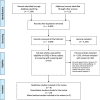Mobilising social support to improve mental health for children and adolescents: A systematic review using principles of realist synthesis
- PMID: 34015021
- PMCID: PMC8136658
- DOI: 10.1371/journal.pone.0251750
Mobilising social support to improve mental health for children and adolescents: A systematic review using principles of realist synthesis
Abstract
Social support is a well-recognised protective factor for children's mental health. Whilst many interventions exist that seek to mobilise social support to improve children's mental health, not much is known about how to best do this. We sought to generate knowledge about the ways in which social support can be mobilised to improve children's mental health. We conducted a systematic review, which followed the principles of a realist synthesis. The following databases were searched: PubMed, CINAHL, Ovid MEDLINE, PsychINFO, EMBASE, Child and Adolescent Studies, EconLit and SocINDEX. Studies were included if the age of participants was between 0 and 18 years and they evaluated or described programme theories of interventions that sought to improve children's mental health by mobilising social support. Relevance and quality of studies were assessed, and data were extracted and analysed narratively. Thirty-three articles were included. Studies varied substantially with regard to the detail in which they described the processes of mobilising social support and expected mechanisms to improve children's mental health. Those that provided this detail showed the following: Intervention components included explaining the benefits of social support and relationships to families and modelling friendly relationships to improve social skills. Pathways to improved outcomes reflected bi-directional and dynamic relationships between social support and mental health, and complex and long-term processes of establishing relationship qualities such as trust and reciprocity. Parents' ability to mobilise social support for themselves and on behalf of children was assumed to impact on their children's mental health, and (future) ability to mobilise social support. Although interventions were considered affordable, some required substantial human and financial resources from existing systems. Mobilising social support for vulnerable children can be a complex process that requires careful planning, and theory-informed evaluations can have an important role in increasing knowledge about how to best address social support and loneliness in children.
Conflict of interest statement
The authors have declared that no competing interests exist.
References
-
- House S, Kahn R. Measures and concepts of social support. In: Cohen S, Syme S, editors. Social support and health. New York: Academic; 1985. p. pp 83–108.
-
- Ferguson KM. Social capital and children’s wellbeing: a critical synthesis of the international social capital literature. International Journal of Social Welfare. 2006;15(1):2–18. 10.1111/j.1468-2397.2006.00575.x - DOI
Publication types
MeSH terms
LinkOut - more resources
Full Text Sources
Other Literature Sources
Medical


